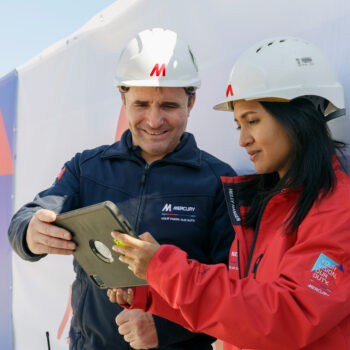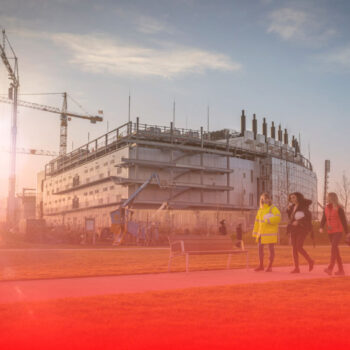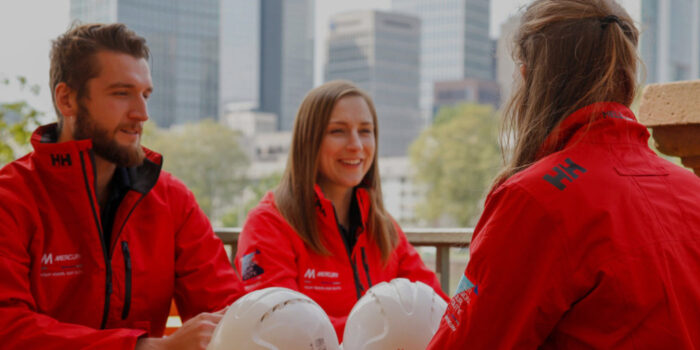News & Insights

Mercury run its Clean Build Philosophy initiative for the second consecutive year
Michael O’Connor and Geoff Riordan, Mercury Engineering.
Following the successful launch of the Mercury Engineering’s ‘Clean Build Philosophy’ programme in 2018, Mercury has launched the initiative once again, issuing business-wide correspondence requesting that all new and existing supply chain Managing Directors & CEOs (re)-affirm their commitment to clean building, utilising the available industry-wide technological advances.
The commitment by our supply chain has been exceptional as they understand the health, safety, quality and productivity achievements of their work as part of the Mercury team.
Michael O’Connor, QEHS Manager at Mercury, is the Chair of the Construction Industry Federation’s (CIF) RCSD Committee. The committee has prepared the Irish industry draft Code of Practice for managing the hazards of Respiratory Crystalline Silica Dust (RCSD). RCSD was officially confirmed as a carcinogen by the Health and Safety Authority (HSA) in June 2017. This Mercury document was communicated at the European Construction Industry Federation (FEIC) in Brussels in May 2018 in conjunction with the CIF.
Mercury have taken the opportunity to eliminate / mitigate silica dust hazards by incorporating the control measures into a practical, user friendly, all construction, dust controlling clean build philosophy which has contributed positively to:
- Eliminating construction dust from multiple tasks
- Respiratory silica dust elimination and mitigation via extraction and suppression methodologies
- Zero impacts / zero hazards to adjacent trades and the public from tasks that previously created hazardous construction dust
- Physical health and well-being benefits to all personnel
- Cleaner projects
- Increased task awareness / planning / controls / safety compliance
- Increased awareness at design stage
In conjunction with our ‘nothing on the floor’ culture as a housekeeping standard, safety measures in this case have measurable benefits to increased health, well-being, safety, culture, quality, productivity, eliminating hazards such as RCSD.
The above photograph demonstrates the Mercury commitment to only purchasing tools and equipment that have extraction and / or suppression capabilities.
Geoffrey J. Riordan, Plant & Tool Manager at Mercury said:
“Our commitment to the safety of our workers is total. We recognise that where hazards that cannot be designed out are present, the possibilities for modern tool and plant to mitigate or eliminate construction hazards are a responsibility that we have been aware of for some time and to that end, we are providing our workforce with the best and safest equipment available to the industry.”
Michael O Connor, QEHS manager, also said:
“Within Mercury, our commitment to the safety, health and well-being of our workforce is a value that is embedded in our DNA. Practical, long-term health and well-being measures such as the commitment to our Clean Build Philosophy positively affects the health of our employees, supply chain, design teams, maintenance personnel, vendors, clients and adjacent public areas.”
An initiative of this kind places Mercury in an industry-leading role, expanded on the global focus on RCSD to develop a practical guidance document that will make a positive short and long term impact to the health and well-being of all stakeholders.
Respiratory silica dust is a known carcinogen. Reliance on Personal Protective Equipment (PPE) is not acceptable as a first line of defence when design and task planning can make (and has made) a huge difference.
Our Clean Build Philosophy contributes to our workforce, maintaining a clean bill of health, and that is something we are very proud of in Mercury.
Our QEHS Standards
Mercury rigorously implement its QEHS policies and procedures to ensure industry leading project delivery and most importantly, the safety and wellbeing of all its employees. To read more about Mercury’s commitment to safety standards, click here.
Recently, Mercury’s Michael O’Connor spoke to the Sunday Business Post on the challenges and future of health and safety in the construction sector. To read the interview, click here.
If we can assist you or your business with anything in relation to the above, please contact us.


